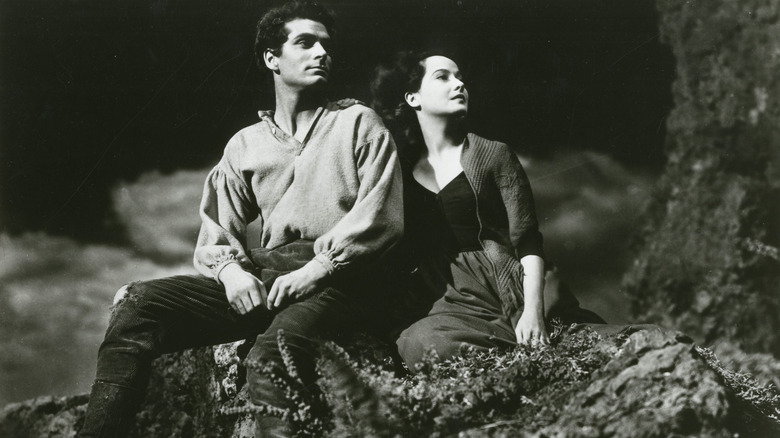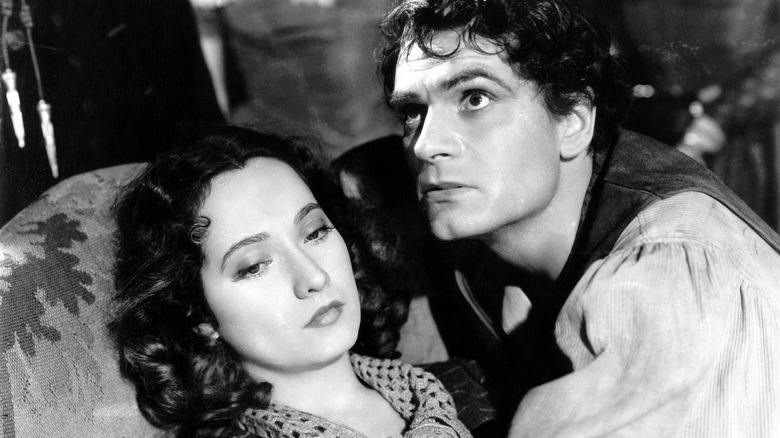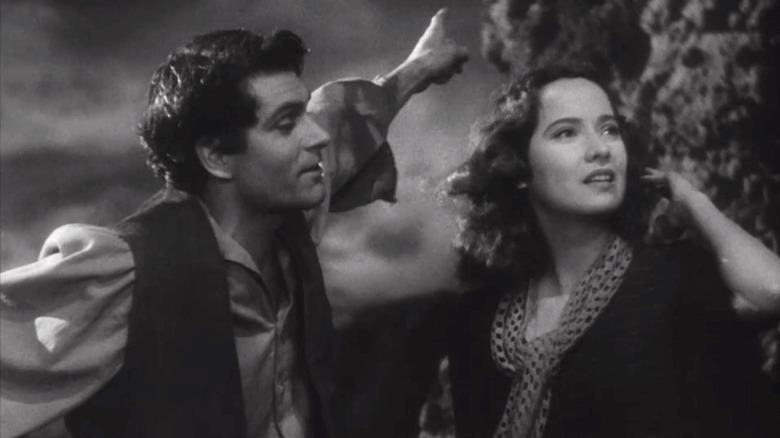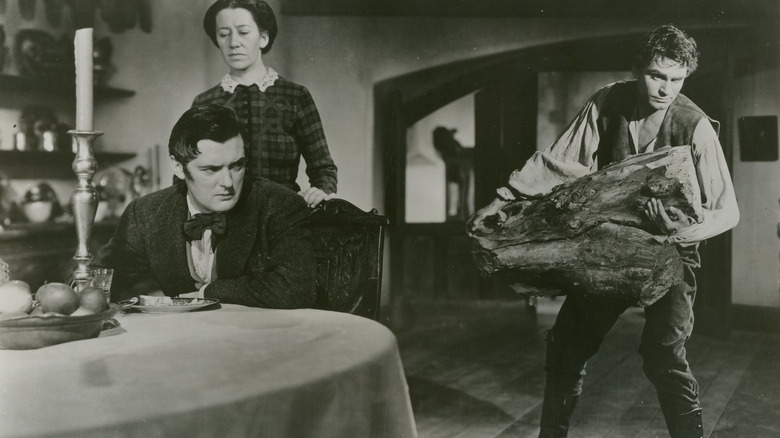Laurence Olivier Was Less Than Polite On The Set Of Wuthering Heights
Prior to William Wyler's acclaimed 1939 film, Emily Brontë's 1847 novel "Wuthering Heights" had — perhaps surprisingly — only been adapted to film once. The 1920 version directed by A.V. Bramble is presumed lost, leaving Wyler's version to remain the earliest — and in many ways, the standard — for Brontë's work on screen. In Wyler's version, Merle Oberon, a rising star at Goldwyn, played the role of Catherine, and a young Laurence Olivier played the gruff, handsome stable boy Heathcliff. Their tempestuous near-romance provides the dramatic center of the film, although — like in most movie versions of "Heights" — the second half of the novel (wherein Catherine and Heathcliff's children cure the intergenerational resentment through a romance of their own) has been excised.
Despite "Heights" being a romance — and one that earns the much-used appellation of "aching" — Olivier and Oberon reportedly loathed working together. Olivier was cynical about working in America ("Wuthering Heights" was his first American film) and there may have been some lingering resentment over the casting: Vivian Leigh, then Olivier's lover and later his wife, wanted to play Catherine, but was considered too much of an unknown in America, and was turned away.
However the resentment began, it was out in full force on the set of Wyler's movie, and their horrendous arguments were detailed in Jan Herman's 1997 book "A Talent for Trouble: The Life of Hollywood's Most Acclaimed Director, William Wyler." Some of the stories in that book make production sound like a living nightmare for both actors.
Olivier's spitting
In an excerpt from the book published in the Los Angeles Times in December of 1995, some of Olivier's bad behavior is explicit.
Prior to working on "Wuthering Heights," Olivier and Oberon had worked together on a British film called "The Divorce of Lady X," a playful Technicolor romance wherein Oberon "tames" the gruff, rude character Olivier plays. That gruff rudeness was, it may prove, not an act. Years after the fact, Olivier would admit that he didn't think much of Oberon's acting in "Divorce," and was quoted in Herman's book as saying "she may have thought that I looked upon her as a 'little pickup' by [producer Alexander] Korda, which she was."
When faced with working with Oberson again, Olivier was in no mood to be playful. Herman's book relates an instance where the co-stars blew up at each other because of Olivier's wild spitting, something Oberon assumed he was doing on purpose. When she said as much to Olivier's face, he exploded:
Oberon grumbled about their love scenes. She stopped one in the middle of a take. "You know, you spat at me," she said. "You had a drop of spittle come flying across in your goddamned passion. You spat, and it hit me."
"Oh, Merle, I beg your pardon," Olivier said testily. "But these things do happen between actors."
On the retake Oberon lost her temper.
"That was worse than anything I've ever seen in my life," she snapped. "I don't think I've ever seen such a badly played shot if I may say so — and you spat again!"
"Why you amateur little b****," Olivier fumed. "What's a little spit for crissake between actors? You bloody little idiot, how dare you speak to me ... ?"
Refusing to apologize
After the above incident, Oberon fled the set in tears, humiliated. William Wyler pulled Olivier aside to admonish him, insisting that the actor go apologize to his co-star immediately, make amends, and return to shooting. Olivier, stricken with stubborn, a-hole pride, staunchly refused, claiming arrogantly that he wouldn't be humiliated. Never mind that Oberon had already been humiliated. Years later, Olivier finally did feel a pang of regret over how awfully he behaved:
"I was abominably pompous with Wyler, who detested me quite rightly. I was so goddamned conceited. I thought I was the cat's whiskers. I thought I knew all about everything to do with the art or the craft. Well, I didn't. But that didn't stop me thinking so, and it took Wyler to bully that out of me."
And bully Wyler did. To cut off the young Olivier's obnoxious behavior, Wyler insisted that the actor bring more to the role than he had intended. In one of old Hollywood's more notorious anecdotes, related in Herman's book, Wyler insisted Olivier repeat takes of a certain scene in "Wuthering Heights." After each take, Wyler would simply give the added direction of "It's lousy. Do it again." After many, many tried, Olivier exploded at Wyler as well. Olivier raved: "For God's sake, I did it standing up. I did it sitting down. I did it fast. I did it slow. I did it with a smile. I did it with a smirk. I did it scratching my ear. I did it with my back to the camera. How do you want me to do it?"
Wyler replied simply: "I want it better."
Wyler's dressing-down
And that wasn't the end of Wyler's attempts to humble Olivier who was, by his own admission, overacting like crazy on "Wuthering Heights." His own arrogance had led Olivier to give a bad performance, trying to act "more" than his co-stars. Wyler, a gruff, short-spoken professional, had lost patience with Olivier's shenanigans and finally decided to give his star a dressing-down in front of the cast and crew. As Olivier recalls it:
"I was overacting appallingly and doing some extravagant gestures. Wyler stopped me and said, 'For crissake, what do you think you're doing? Do you think you're at the Opera House in Manchester? Come down to earth. I don't want a "great performance." Tell me, Larry, what dimension do you reckon you've got to now?'"
Oliver responded by yelling, angrily "I suppose this anemic little medium can't take great acting!" This was the silliest possible thing to say and Oliver recalls the embarrassing bloat of ego he must have displayed. Wyler, in a response that was both organic and tactful, burst into laughter. It seems for Olivier, the moment of humility required a moment of humiliation. The actor finally realized what an ass he had been, and finally — finally — managed to tone it down, listen to his director, and not treat everyone else so badly. Years later, Olivier admonished himself: "I was a fool, a stupid, conceited, pompous little bastard."
Oberon would continue to work throughout the 1960s and died in 1979 at the age of 68. Olivier worked consistently up through his death in 1989 at the age of 82. They never made a film together again.



